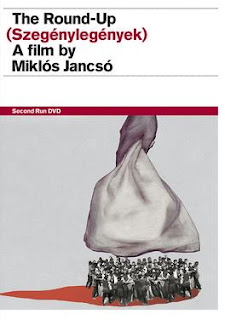Szegénylegények; historical drama, Hungary, 1966; D: Miklós Jancsó, S: János Görbe, Zoltán Latinovits, Tibor Molnár, Gábor Agárdy
A prison in Hungary, 1868. The 1848 Hungarian Revolution failed, and thus the authorities are persecuting the last remnants of the followers of Lajos Kossuth and outlaw Sandor Rosza. The prison officers suspect that some of Sandor's men are among the convicts, so they summon a convict, Janos, who is sentenced to be hanged, and offer him amnesty if he can find someone who killed more people. Janos becomes a snitch and singles out convict Veszelka as one of Sandor's men, but since Veszelka doesn't want to confess anything, the prison guards whip a woman he loves in a gauntlet, causing her to die, so Veszelka, who was forced to watch from the tower, jumps into his death. Janos is later found strangled in his cell. The prison guards suspect convict Kabai. The prison guards start a mobilization of the convicts, and order convict Torma to assemble a unit made out of the former rebel army. The guards declare that their leader, Sandor was given amnesty, but that this does not apply to his unit, which is now identified and captured.
Ranked in a local poll ("The Budapest Twelve") as the best film of Hungarian cinema, Miklos Jancso's drama "The Round-Up" is in reality still a notch below all the hype. Set in only one location, a prison in the middle of a meadow, far away from anywhere, where the authorities are frantically searching for the remnants of the former rebel army of the failed 1848 Hungarian Revolution, the movie was interpreted as a sly allegory on the anti-communist '56 Hungarian Revolution, with a sense of isolation of the Eastern Europe and a well conjured up, depressive feeling of repression and authoritarianism. It starts with cynical sketches of military uniforms, boots, helmets, guns, sabers and cannons, as the narrator explains: "The spirit of 1848 has become a mere empty phrase..." Jancso is able to craft aesthetic, sharp shot compositions, but the overall storyline is still too monotone, grey, standard and narrowed down. The character development is abandoned as there are no emotions, no intimate scenes or some clever lines that gives these characters some greater interest, leaving the whole cast as cold, disposable (the top billed actor playing the seemingly main role of snitch Janos dies already some 57 minutes into the film) and mechanical. Only occasionally does the film offer some more untypical or strange situation (a naked woman running in between a row of some twenty prison guards who whip her). The final ploy with which the prison guards manage to trick the convicts into revealing they were members of the rebel army is neat, yet the movie simply needed a more colorful, higher amplitude of events and style.
Grade:++





No comments:
Post a Comment